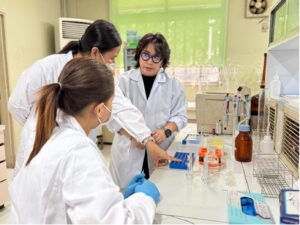Over the past four months, from January to April, AJFVC has made significant efforts to enhance food safety and agricultural standards. This included a two-week intensive training program focused on pesticide residue analysis for Cambodia and Lao PDR so far. A key factor in the program’s success was the involvement of highly skilled trainers from the region: Chanita Thongsam from Thailand, along with Julio Valeza and Imelda Gaza from the Philippines, who played vital roles in giving the lectures to the participants as well as guiding them during hands-on training at the laboratory.
Expertise at the Forefront
Chanita Thongsam, a Senior Professional Scientist with 15 years of experience at Thailand’s Department of Agriculture (DOA), led the training sessions for participants from Lao PDR. With her extensive experience in pesticide residue analysis, Chanita provided the participants from Lao PDR with valuable insights into various topics, including analytical procedures and the handling of chromatography equipment. In her training sessions, Chanita not only instructed but also emphasized the importance of understanding of why each analytical step is crucial.
In the Philippines, the class-based lectures were conducted by Julio Valeza, the head of the Pesticide Residue Unit (PRU) at the Bureau of Plant Industry (BPI). Julio shared his extensive knowledge on pesticide residue with the participants from Cambodia and guided them in doing calculations and exercises in quality control procedures. His enthusiastic approach to training left a lasting impact on participants, who appreciated his clarity and passion for the subject matter. During the hands-on training, Imelda Gaza, a Senior Analyst at PRU, took the lead. Participants praised her hands-on guidance, which included the maintenance and troubleshooting of chromatography equipment.

A Collaborative Learning Experience
The intensive training program greatly benefited from the prior experiences of the trainers, who had participated in a study tour to Japan last year. This opportunity allowed them to gain insights into pesticide control and residue analysis, enriching the training with a blend of international practices and local knowledge. Each trainer brings a unique approach to the training, and each is effective in their own way. Beyond the contributions of the trainers, additional support from teams at the DOA Thailand and BPI Philippines ensured a smooth and productive learning experience. Their remarkable dedication was instrumental to the training’s success.
Looking Ahead
The successful completion of this training marks a significant step toward enhancing food safety standards in the ASEAN region. As the project progresses, similar initiatives will continue to empower agricultural professionals across target countries, fostering a collaborative approach to addressing the food safety challenges inherent in agricultural practices.